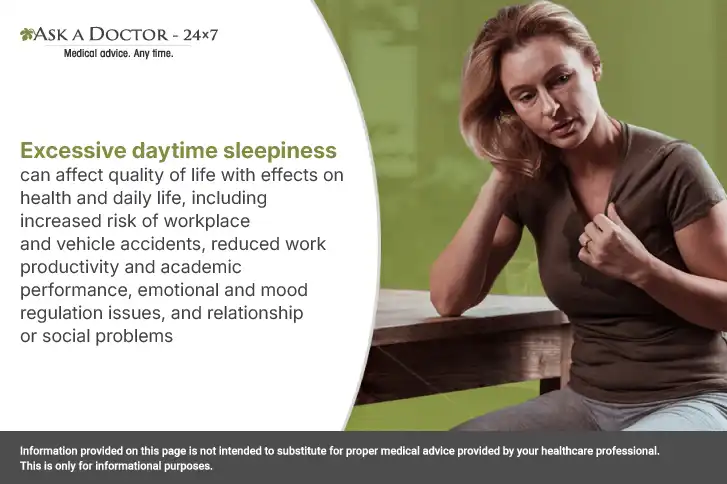5 Questions To Ask Your Doctor About Excessive Daytime Sleepiness
Having trouble remaining awake or attentive or wanting to sleep more during the day, are signs of excessive daytime sleepiness, also referred to as daytime somnolence or hypersomnia. The feelings of sleepiness may be stronger when you are sedentary, such as while driving or sitting at work. While occasional tiredness following a lack of sleep is acceptable, prolonged episodes of drowsiness that occur nearly daily for at least three months are considered excessive daytime sleepiness (EDS).
Do you know that excessive drowsiness throughout the day can be an indication of insufficient sleep, sleep disorders, or other medical issues? Yes, excessive daytime sleepiness should be taken seriously, even if it is not a disease in itself. To correctly diagnose and address this condition, it's critical to recognise the symptoms of excessive daytime drowsiness. Let’s look into this blog to determine all you can discuss with your doctor about excessive daytime sleepiness.
Symptoms of Excessive Daytime Sleepiness

Sleep is essential for immune system restoration, memory consolidation, and other critical functions. Consequently, poor sleep quality can lead to a variety of symptoms that aren't always directly related to sleep.
If you are experiencing any of the following symptoms, you may be suffering from excessive daytime sleepiness:
- Having trouble being vigilant
- Feeling irritated
- Memory issues
- Inability to concentrate
- Trouble remembering new things
- Trouble making judgments
- Slower reaction times
- Behaviors that involve taking risks
What Questions to Ask Your Doctor about Excessive Daytime Sleepiness
When discussing excessive daytime sleepiness with your doctor, you must ask about causes, diagnostic procedures, available treatments, and associated hazards. Here are five questions to ask your healthcare provider:
1. What can be the reason behind my extreme daytime drowsiness?
Excessive daytime sleepiness is commonly related to poor sleep hygiene or not getting enough total hours of sleep each night. EDS may also result from certain drugs or sleep disorders such as narcolepsy (a neurological disorder that disrupts the regulation of sleep-wake cycles) or sleep apnea (total or partial occlusion of the upper airway during sleep). It might also be connected to neurological illnesses (Parkinson’s disease), mental health difficulties (depression), or problems with your circadian rhythm.
Medications commonly linked to excessive sleepiness include antidepressants, antihistamines (found in sleep aids or allergy medications), anti-emetics (used to control nausea and vomiting), antipsychotics and anticonvulsants (used to treat depression or seizures), medications to treat high blood pressure (such as alpha and beta blockers), benzodiazepines and other sedatives (often used to treat anxiety or insomnia), medications for Parkinson's disease, muscle relaxants, opioids, other prescription.
2. What examinations will be required to identify the source of my drowsiness?
To evaluate your sleep habits and degree of daytime drowsiness, your physician may suggest a multiple sleep latency test (MSLT) and/or a sleep study (polysomnography). The MSLT test measures how quickly you fall asleep during daytime naps, helping to diagnose conditions like narcolepsy or hypersomnia. Polysomnography is an overnight sleep study that monitors various bodily functions during sleep, such as brain waves, eye movements, and heart rate. It also helps identify sleep disorders, such as sleep apnea. To rule out other medical issues, your doctor could also request imaging tests or blood testing.
3. Is sleepiness linked to other health conditions?
Certain medical conditions can cause or worsen daytime sleepiness. E.g., obesity is a factor consistently linked to daytime sleepiness. Obese people are twice as likely to report EDS as non-obese individuals. Likewise, anxiety can cause insomnia at night, which makes an individual prone to sleepiness during the day. Depression saps energy and induces daytime somnolence. In hypothyroidism body's metabolism is slowed down, which can lead to reduced energy levels and increased feelings of fatigue, impacting circadian rhythm. This results in hypersomnia, characterized by excessive daytime sleepiness.
4. What lifestyle changes could help improve sleepiness?
A doctor may advise improving sleep hygiene by establishing a regular sleep schedule, optimizing the bedroom environment, avoiding caffeine and alcohol before bed, and regular exercise. Also, regular sunlight exposure can help regulate the body's natural sleep-wake cycle. Additionally, doing regular exercise, eating a healthy diet, and managing stress can significantly impact sleep quality and daytime alertness.
5. What are the treatment options available for EDS?
Treatment depends on the underlying cause and could range from lifestyle changes to medications or other therapies, such as Continuous Positive Air Pressure (CPAP) machines for sleep apnea. A CPAP machine delivers continuous air through your mouth and/or nose to help keep your airways open while you sleep.
Conclusion
While occasional fatigue is natural, excessive daily sleepiness is more than just a feeling of exhaustion. If you consistently nod off during the day, even when you receive the required 7 to 9 hours of sleep at night, it's time to get treatment. Sleep disorders need to be diagnosed and treated by your healthcare provider, who will determine the treatment for the underlying disorder. Hence, identifying the causes of excessive sleepiness may involve investigations into lifestyle choices, medications, physical health, and mental states.
If you have any questions related to daytime sleepiness, you can Ask a Physician at Ask a Doctor - 24x7.
Recently Answered Questions Related to Excessive Daytime Sleepiness
- What Causes Excessive Daytime Sleepiness?
- Suggest a Remedy For Central Sleep Apnea
- What Causes Difficulty In Breathing When Diagnosed With Anemia?
- What Are The Medical Properties Of Zolfresh?
- Suggest Ways To Manage Insomnia
- How To Cure Excessive Daytime Sleepiness?
- Can Strocit Tablet Cause Sleeplessness?
- Suggest Remedies For Anxiety
- Are Clonazepam And Gabapentin Addictive At Small Doses?
- Can You Have Narcolepsy And Periods Of Insomnia Too At The Same Time?
- Causes of Excessive Daytime Sleepiness?
Disclaimer: Information provided on this page is not intended to substitute for proper medical advice provided by your healthcare professional. This is only for informational purposes.
Ask a Specialist
Recent Questions


